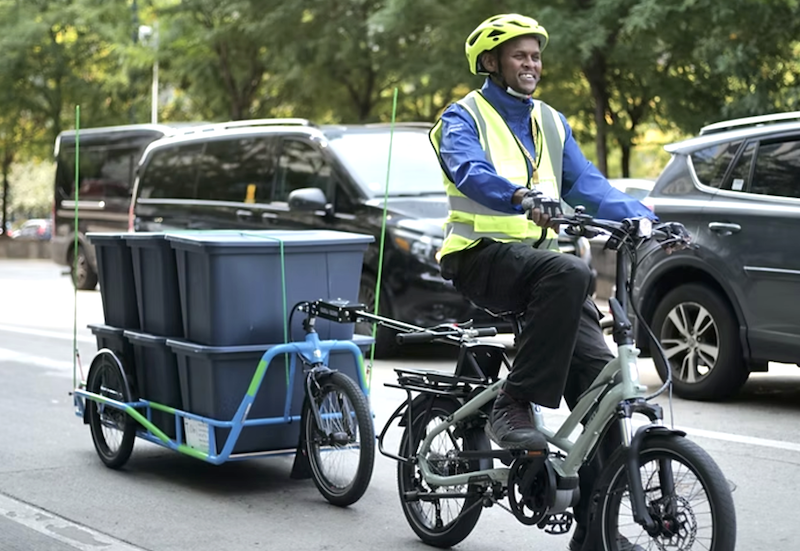
• Flip Book • eNews • eNews • eAdventures • eCities • eCargoIntl • eBikeTypes • eRoad • eMTB • eUrban • eCargo • eBikeTests • eAccessories • eBikeShops • eFeatures •

• Flip Book • eNews • eNews • eAdventures • eCities • eCargoIntl • eBikeTypes • eRoad • eMTB • eUrban • eCargo • eBikeTests • eAccessories • eBikeShops • eFeatures •
May 6, 2025 - As the micromobility sector continues to evolve around the globe, commercial e-mobility enterprises are eager to make progress as well despite a cautious and shifting playing field. Europe continues as the global leader in e-mobility integration while North America is making steady gains albeit somewhat fragmented.
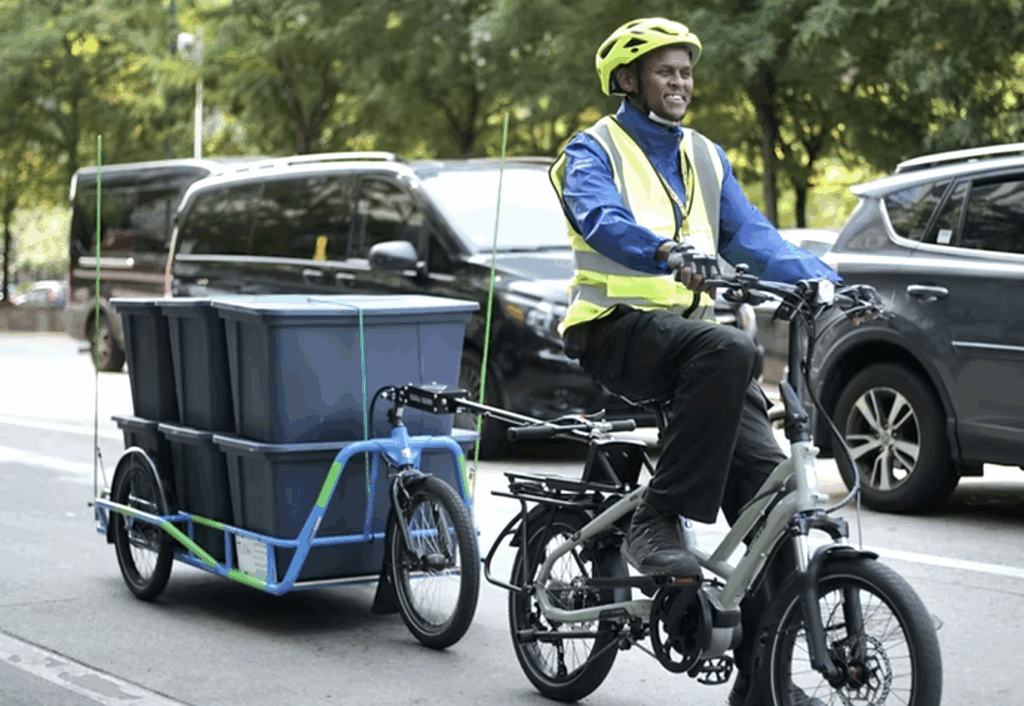
“The biggest challenge for companies operating in the e-mobility industry is the lack of incentives,” says Mark Chiusano, CEO of Net Zero Logistics and sister company Cornucopia Logistics that are significant players in the tri-state area servicing New York, New Jersey, and Connecticut.
Cornucopia works with Amazon and the two urban e-commerce delivery companies have about 900 e-bike messengers making thousands of weekly deliveries while employing 700-1,000 people depending on the time of year. (at press time Amazon announced that it is adding more than 250 e-cargo bikes to its fleet of delivery vehicles).
Infrastructure is another key part of success and New York City’s recent announcement of a 3-year pilot of on-street microhub zones to provide safe, dedicated spaces for truck operators, e-cargo bikes, handcarts, and smaller electric sprinter vans to facilitate last leg deliveries via safer and more sustainable modes of transportation, is a welcome step in the right direction.
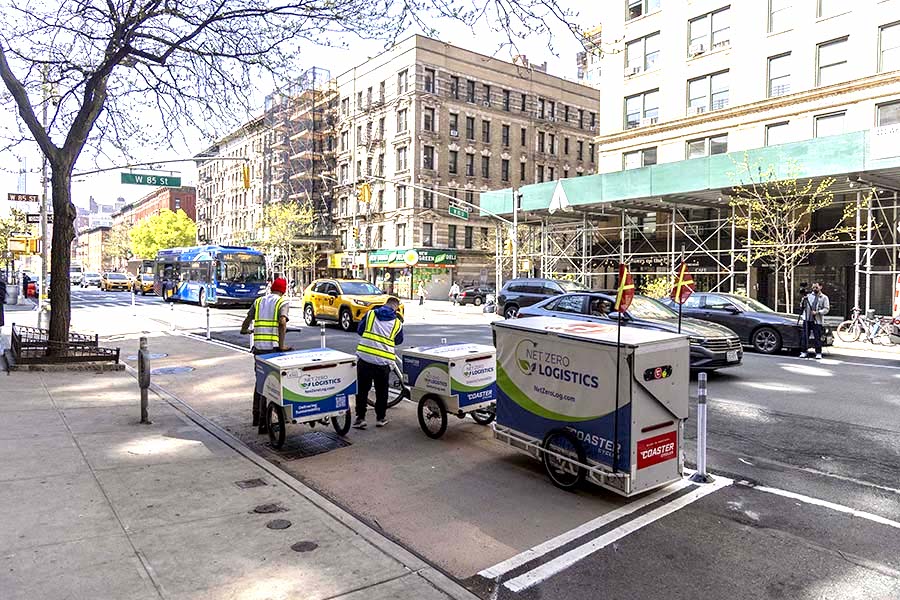
“Joining forces with NYC DOT on this ground-breaking initiative aligns perfectly with our mission to provide sustainable and efficient delivery solutions,” said Chiusano in the official NYC press release. “We are excited to contribute to a cleaner, greener New York City while helping to alleviate traffic congestion.”
NYC’s leadership follows its new rules to expand access to e-bike battery charging cabinets on sidewalks, a successful initiative allowing the safe charging of lithium-ion batteries by delivery workers in regulated, public locations to combat lithium-ion battery fires, and new cargo bike rules that allow longer bike-trailer combinations and the use of four- wheeled van-like cargo bikes.
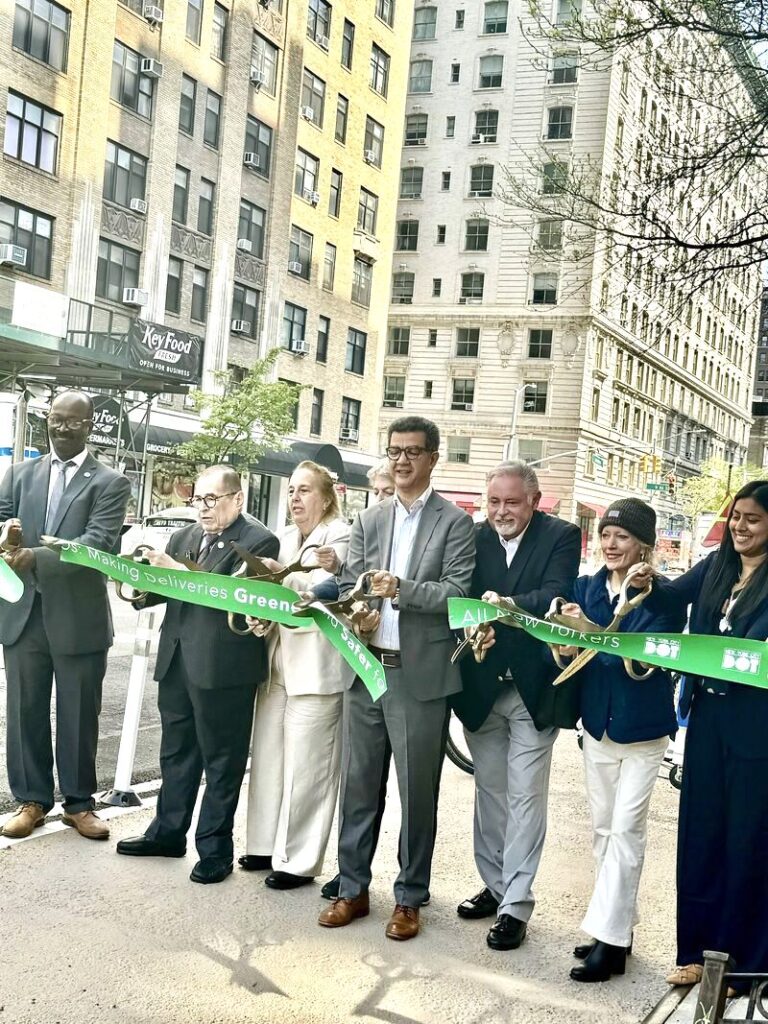
“The demand is there and companies like ours are eager to work with the city to ramp up service. Another innovative project we’re involved with is the NYC Blue Highways to use barges and last-minute e-delivery operations like ours to efficiently and effectively move goods,” added Chiusano.
Unveiled in 2023 the Blue Highways initiative plans to utilize waterways, cargo bikes, and low and zero emission vehicles to move goods and reduce congestion while supporting safer and more environmentally friendly deliveries.
The recent inauguration of Downtown Skyport, formerly the Downtown Manhattan Heliport (DMH), marks NYC’s commitment to transform the city-owned site from a heliport into a multi-modal hub for sustainable transportation and last-mile freight delivery. The transition includes upgrading the site’s infrastructure for electric vertical take-off and landing (eVTOL) aircraft, and building out the maritime freight berthing infrastructure to make New York City’s Blue Highways a reality.
Marcus Hoed, co-founder of DutchX, a leading zero-emission carrier in the U.S., spoke at the launch, “In the twenty years since I left Amsterdam for New York, it’s never been a more exciting time for this city. I’m so proud of our team’s work on the Blue Highway, piloting a route on the Hudson to bring last-mile parcels into Manhattan.”
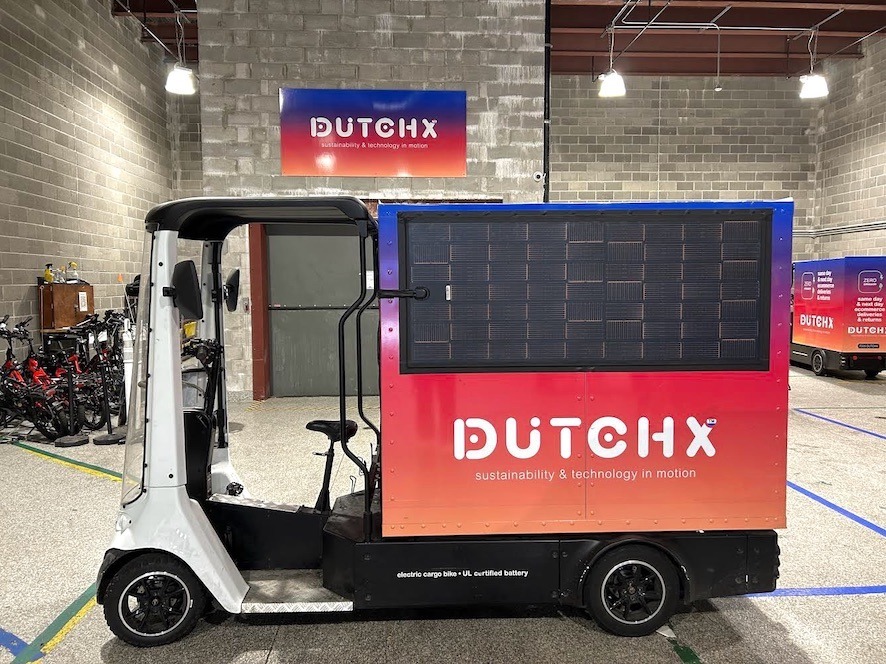
The trajectory from two wheels, to three-wheel trikes, is now on the fast-track to e-cargo quads. DutchX is also the first large-scale carrier in the country to install solar panels on electric cargo bikes for last-mile delivery in collaboration with Merlin Solar, a pioneer in crystalline silicon solar technology – their lightweight, high-efficiency panels are engineered to deliver 20% more energy in real-world conditions.
This innovation reduces reliance on grid electricity and emissions tied to battery charging, marking a new era in the logistics industry. As a next step, DutchX is exploring adding solar panels to other vehicles in its multi-modal fleet, including light EVs and electric vans.
Chiusano says exciting things are coming for Net Zero Logistics and Cornucopia and their e-cargo quads. Amazon, one of their clients, has already launched its first UK micromobility hub and e-cargo bike quads there. “We can’t say much right now but the automotive industry is involved and we expect to make announcements soon,” he commented.
Ben Morris, CEO of Coaster Cycles, the USA’s largest e-trike manufacturer, echoes the automotive industry’s involvement. “The automotive sector is a natural player to be involved with 4-wheel electric quads. To supply service, parts and the infrastructure behind the scenes for such vehicles is no small feat yet the automotive industry has a framework and experience to make it happen,” says Morris.
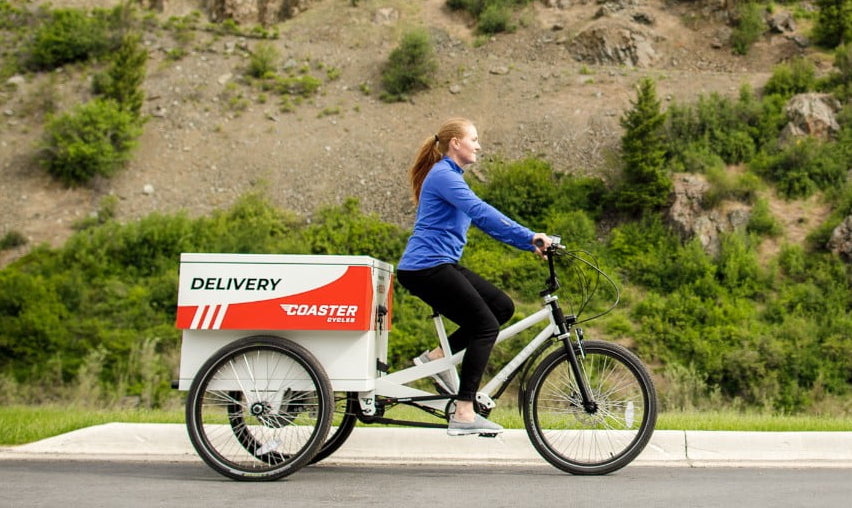
He notes that while New York City is leading the charge there are many others making progress including LA, Washington DC, San Diego, San Francisco, Denver, Portland, Boston, Seattle, Chicago, Minneapolis, and more.
Portland’s Bureau of Transportation is hoping to launch a Micro-Delivery Hub (Microhub) pilot soon in conjunction with local businesses such as B-Line Sustainable Urban Delivery to deliver on its Climate Emergency Declaration and 2040 Freight Plan.
Micro-delivery hubs are a critical element in Portland’s vision for a cleaner, equitable, and more sustainable city, while modernizing the city’s freight and logistics network and reducing transportation related carbon emissions.
“These are exciting times for micromobility and transportation communities across North America, but lots of challenges remain,” adds Morris. “OEMs (Original Equipment Manufacturers), operators (Net Zero Logistics, DutchX, B-Line Sustainable Urban Delivery) and custom players (Amazon) need to keep working together to implement better synergies.”
Companies like Michelin, are also involved and launched their X Tweel airless radial tires for e-cargo trikes which debuted at the 2022 Consumer Electronics Show in Las Vegas. The new tire was mounted on a Coaster Cycles eCargo trike in their booth in the eMobility Experience and Test Track area.
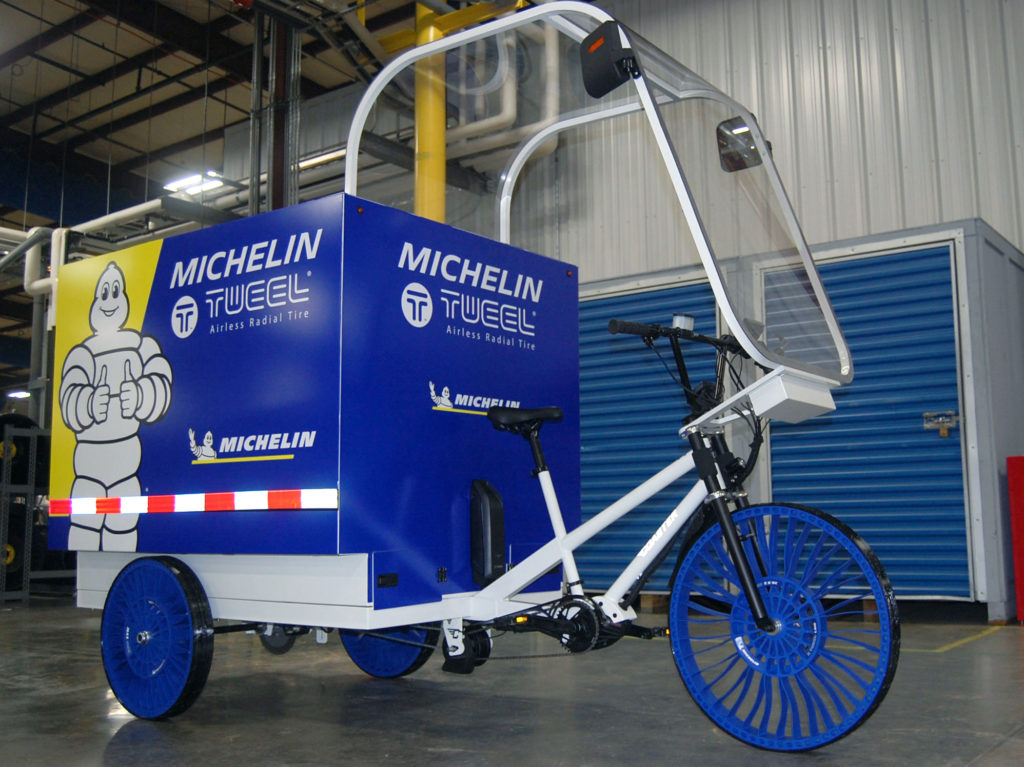
Both Morris and Chiusano are keen to work with companies like Michelin and the duo recently partnered on the Boston Delivers 18-month, e-cargo bike delivery pilot program, to service local residents and businesses in Allston and the surrounding area. Net Zero utilized Coaster Cycles’ Venture trikes, but according to Chiusano the density of the selected region was not robust enough to effectively sustain the program and it will not be continuing.
This points to the many challenges that the micromobility sector faces as outlined in an Urban Freight Lab report back in June 2023 on the barriers to scaling up cargo bikes for last-mile deliveries in the USA.
Both federal and state rules for e-bike batteries and the type of cargo bikes that can be used and how they can be used are factors, including the constant maintenance that bike fleets require along with finding skilled mechanics. In addition, wages for bikers must compete with those of van/ truck drivers.
Chiusano’s input helped explain the complexity of operations in New York City. Here are some of the key points from the meeting with stakeholders held at the Urban Freight Lab – give commercial cargo bikes access to curb parking and/or dedicated parking spaces; create zero- and low-emission zones; create a cargo bike-specific regulatory framework; repurpose underutilized areas to microhubs; rebate commercial e-cargo bike purchases; subsidize e-cargo bike delivery services.
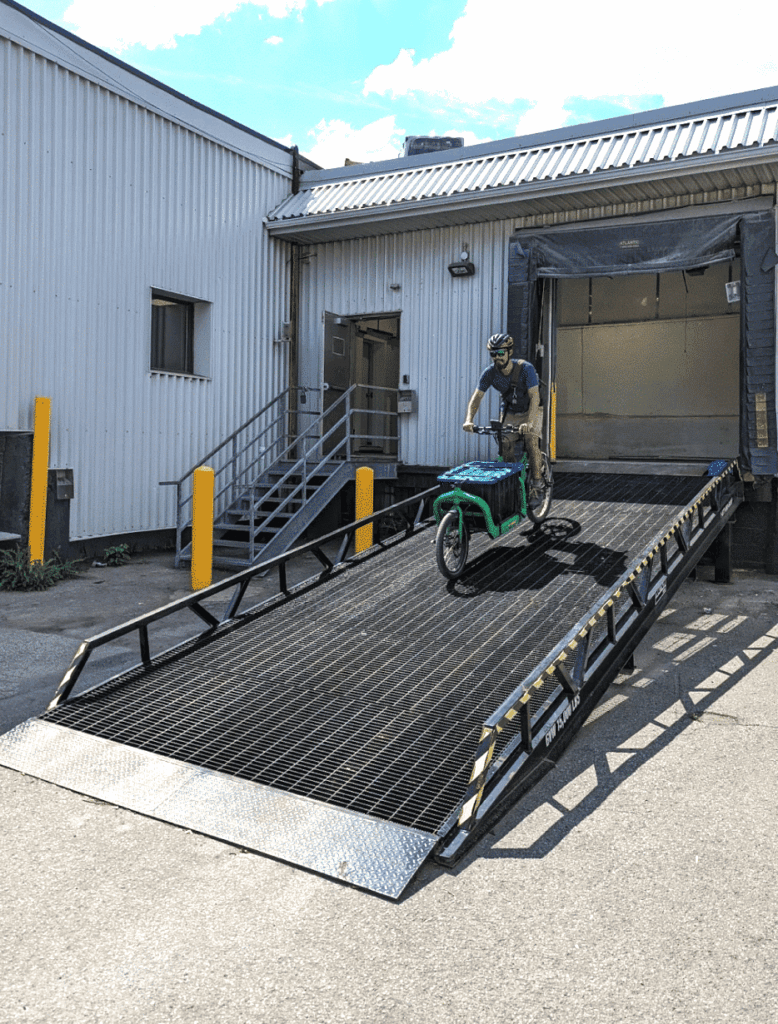
Canada faces similar challenges as Montreal’s Colibri project will be closing its Maisonneuve mini-hub this year as the facility will undergo a planned transformation. Its Iberville mini-hub launched in 2022 is continuing and delivered a total of 216,000 parcels via a dozen e-cargo bikes in 2024.
Coop Carbone, which manages the urban logistics and sub-lets to carriers, says they’re in the middle of negotiations to open a second mini-hub in Montréal and just finalized a permanent mini-hub in Québec City. “More carriers are interested in cargo bike delivery but help is needed for activation,” added Caroline Marie, Sustainable Logistics Program Manager.
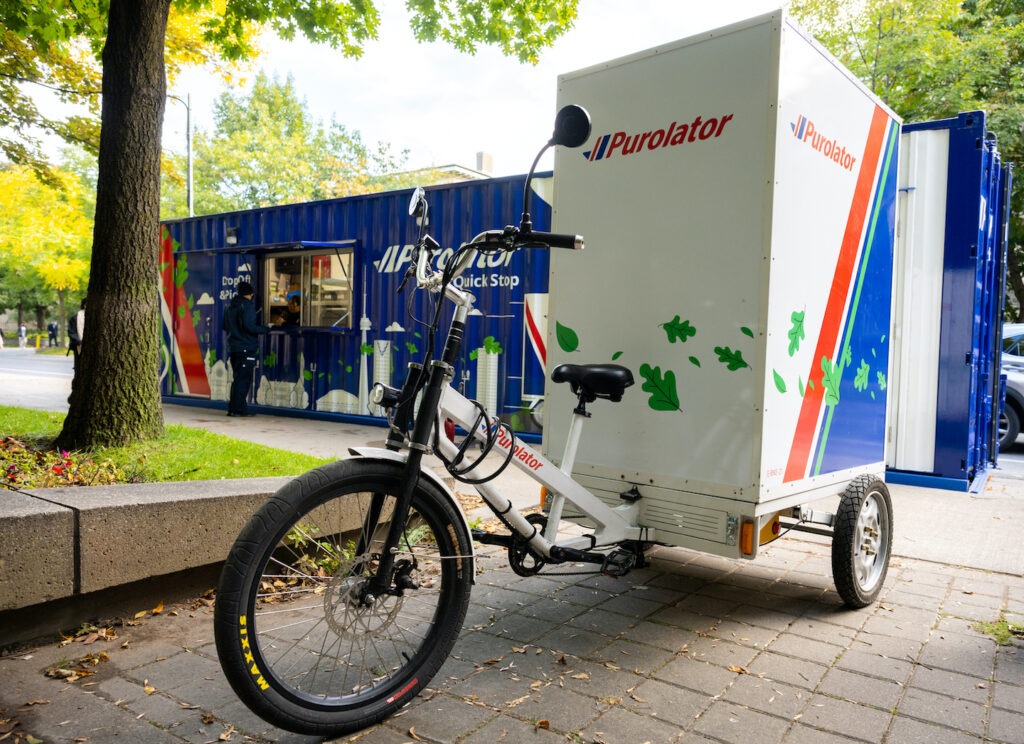
Purolator Canada works with the Colibri project and claims to have delivered more than two million packages using their electric vehicles which include 20 e-cargo bikes in operation across Ontario, Quebec and British Columbia.
“We are planning to expand our fleet of electric cargo bikes as part of our ongoing commitment to reduce our environmental impact,” said Emily Innes-Leroux, Senior Consultant, Communications. “Our e-cargo bikes are often deployed in conjunction with our Urban Quick Stop mini hubs. They’re quiet and produce no tailpipe emissions, reducing pollution, and our couriers have reported a high degree of satisfaction delivering by e-bike while delivery volumes have remained consistent.”
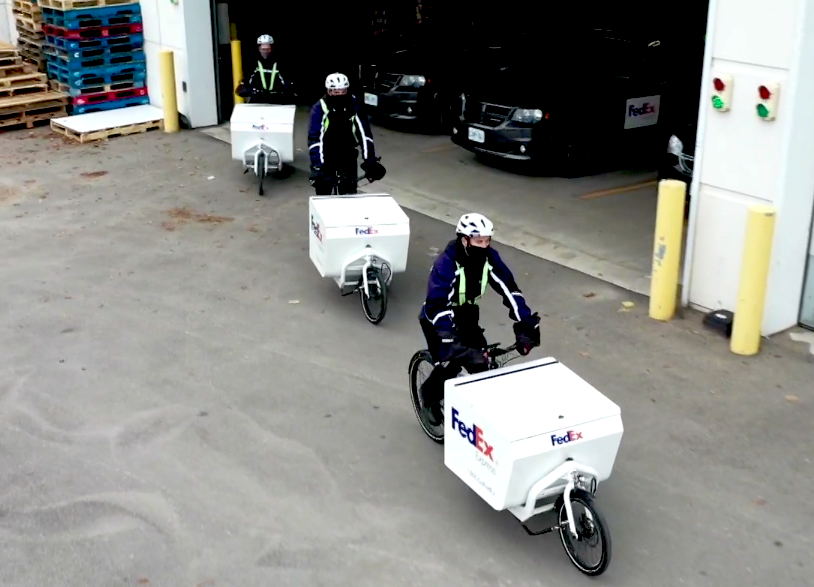
FedEx Express began with three e-cargo bikes in Toronto back in 2020 – the first for FedEx in the Americas – and now boasts almost 50 units including Fulpra’s Roll 3000L models since last year. Operating as well in Ottawa, Calgary and Vancouver almost 400,000 packages have been delivered by e-cargo bikes. FedEx continues working toward its goal to transition their entire 4,800-strong delivery fleet to all electric vehicles by 2040.

Toronto’s NRBI (Near By), launched in 2021, saw immediate success and later expanded into Vancouver with an overall fleet of 40 e-cargo bikes. Recognized as Canada’s largest cycling logistics operation, microhubs are an important part of their operations. In February 2025, NRBI was acquired by Nationex based in Saint-Hubert, Quebec. Nationex claims to manage Canada’s largest green delivery zone servicing 55% of Quebecers without emitting greenhouse gases.